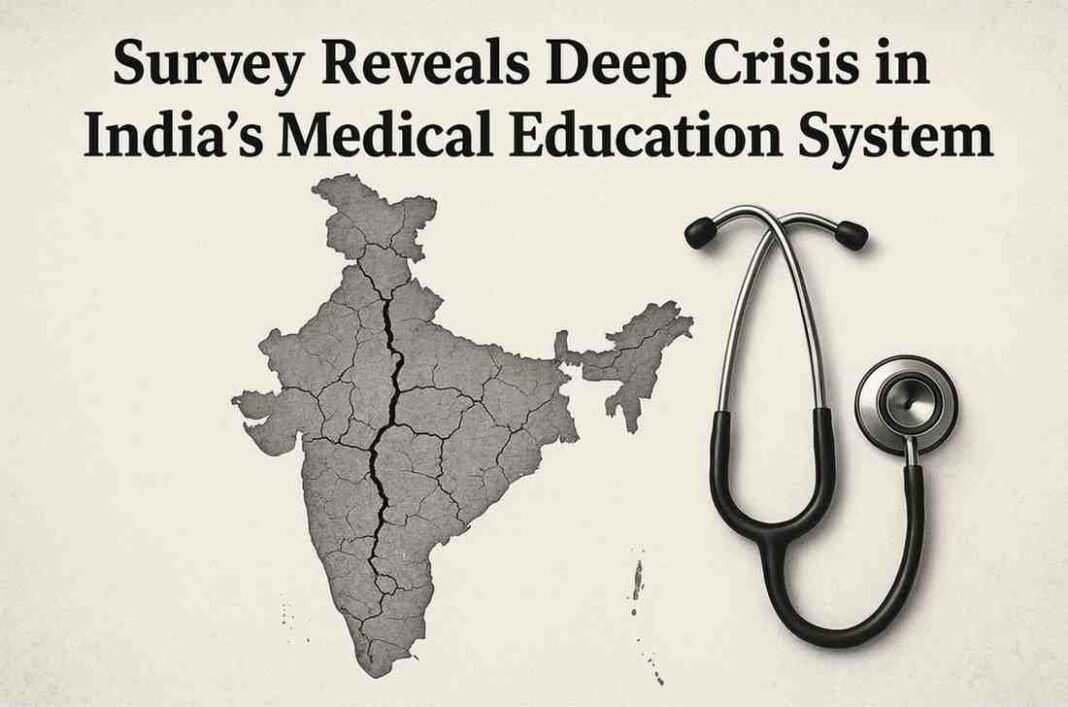Survey Exposes Deep Flaws in India’s Medical Education System
A recent nationwide survey has unveiled severe gaps in India’s medical education network, raising concerns about the conditions under which the country’s future doctors are being trained. Conducted by the Federation of All India Medical Association (FAIMA) under its FAIMA-Review Medical System (FAIMA-RMS) initiative, the study collected more than 2,000 responses from medical professionals and students across major institutions, including AIIMS, PGIMER, and JIPMER. The findings paint a worrying picture of widespread infrastructural inadequacies, excessive workloads, and poor mental health support among India’s medical staff.
Nearly 90% of Colleges Report Poor Infrastructure
According to the survey, 89.4% of medical colleges cited substandard infrastructure, including outdated facilities, inadequate classrooms, and poorly equipped laboratories. The situation was found to be worse in government-run institutions, which accounted for 90.4% of total responses, compared to 7.8% from private colleges. Despite government colleges offering broader patient exposure, they continue to struggle with overcrowded wards, insufficient maintenance, and lack of modern equipment.
While 71.5% of respondents reported adequate patient exposure, only 54.3% said they had regular teaching sessions, and 68.9% felt laboratory facilities were up to mark. The FAIMA report highlights that this infrastructural neglect directly affects both the quality of education and the training experience of medical students.
Toxic Work Culture and Excessive Clerical Duties
A significant 40.8% of respondents described their work environment as toxic, citing overwork, lack of appreciation, and minimal support from senior staff. The survey revealed that 73.9% of resident doctors are burdened with excessive clerical responsibilities that eat into their learning and rest time. Many participants expressed frustration over being treated as administrative assistants rather than medical trainees, leading to burnout and declining morale.
Timely payment of stipends also remains a persistent issue, with barely half of the respondents reporting regular payments. Only 29.5% said they had fixed working hours, and a large number complained of being forced to work beyond permissible limits without compensation or adequate rest.
Shortage of Manpower and Academic Gaps
The FAIMA survey found that 55.2% of medical professionals faced shortages in manpower, affecting not just patient care but also the quality of medical education. Faculty shortages were particularly evident in rural and semi-urban colleges, where residents often had to shoulder additional teaching and administrative duties.
Despite 70.4% of respondents expressing confidence in their clinical skills, 57.4% admitted that there remains a considerable gap between theoretical instruction and practical training. This disconnect, according to FAIMA, poses serious risks to healthcare quality and the preparedness of new doctors entering India’s medical workforce.
Mental Health Neglect Remains a Major Concern
The report underscores how structural inefficiencies and excessive workloads have contributed to rising mental health challenges among medical students and residents. FAIMA linked these problems to widespread stress, anxiety, and emotional exhaustion in the medical community.
The findings follow recommendations from the 2024 National Task Force on Medical Education, which had called for fixed duty hours, the appointment of counsellors in every medical college, mandatory parental involvement in wellness programs, and 10 days of annual mental health leave. However, FAIMA noted that very few institutions have implemented these measures a year later.
FAIMA Calls for Immediate Government Intervention
Speaking on the findings, FAIMA President Dr. Akshay Dongardive said, “We plan to submit this report to the authorities for corrective action. The goal is to align India’s medical education system with global standards.”
The association has urged the Union Ministry of Health and Family Welfare to step in and address the systemic shortcomings that continue to affect both academic and mental well-being. FAIMA also plans to submit a detailed set of recommendations to the National Medical Commission (NMC) and NITI Aayog, though it noted that repeated efforts to meet NMC officials have gone unanswered.
“The authorities must engage more actively to fix these long-standing issues,” FAIMA’s statement read, emphasizing that the well-being of India’s medical professionals is essential to sustaining a robust public health system.
The Road Ahead
The survey’s revelations have sparked renewed debate on the urgent need for reforms in India’s medical education sector. With the country relying heavily on its healthcare workforce, FAIMA’s findings serve as a wake-up call to policymakers, administrators, and regulators to prioritize the welfare and training of medical professionals who form the backbone of the nation’s healthcare system.








